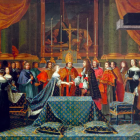Domestic Whimsy in Fascism’s Shadow
![]() In the preface to her 1963 novel Family Lexicon, Natalia Ginzburg immediately calls into question whether the book is actually a work of fiction: “The places, events, and people in this book are real. I haven’t invented a thing,” she says. The book is about Ginzburg’s family: her secular Catholic mother, secular Jewish father, and the siblings, friends, servants, and colleagues that populate their social sphere. It’s also about the rise of fascism in Italy, and about a bohemian intellectual family’s experience of World War II and its aftermath. Ginzburg says that while writing the book she felt “a profound intolerance for any fiction” but also, however, admits that “one should read it as if it were a novel.”
In the preface to her 1963 novel Family Lexicon, Natalia Ginzburg immediately calls into question whether the book is actually a work of fiction: “The places, events, and people in this book are real. I haven’t invented a thing,” she says. The book is about Ginzburg’s family: her secular Catholic mother, secular Jewish father, and the siblings, friends, servants, and colleagues that populate their social sphere. It’s also about the rise of fascism in Italy, and about a bohemian intellectual family’s experience of World War II and its aftermath. Ginzburg says that while writing the book she felt “a profound intolerance for any fiction” but also, however, admits that “one should read it as if it were a novel.”
Some of Ginzburg’s aversion to thinking of the work entirely as fiction perhaps stems from the fact that Family Lexicon isn’t simply a family novel—it’s also a record of a lost world and a lost way of life. The book is episodic and ruminative: Ginzburg introduces phrases, jokes, and anecdotes that recur in different contexts over the course of decades. The dialogue is funny, specific, and immediately characterizing, as is the level of detail about each character and his or her preferences, quirks, and habits. Interestingly, events that might be considered key plot points in a different sort of novel—the deaths and marriages of main characters, exiles and imprisonments, invasion and persecution—are told to the reader as asides, often in single sentences. By contrast, the peculiarities of family life—protagonists’ clothing preferences, domestic squabbles, linguistic quirks—are given a lot of space on the page. Ginzburg’s insistently domestic narrative style, in its humanizing particularity, is itself an act of resistance against the ascendant totalitarian ideologies that loom over the family’s life.
From the novel’s beginning, Ginzburg describes the titular family’s intense interest in politics. The substance of political conversations, however, is often brief and blurred, and political exchanges seem relevant to the novel because of their role in characterizing the family, rather than explaining or exploring the substance of the political beliefs themselves:
At home we had ferocious arguments over politics, which ended in tantrums, napkins hurled into the air, and doors slammed so hard the whole apartment shook. That was during the early years of fascism. I still can’t understand what they were arguing about so vehemently since my father and siblings were all against fascism.
The conversation is bookended by extended, detailed characterizations of Ginzburg’s father, a blustering, high-energy scientist who’s enamored with the mountains and always criticizing his children:
My father liked his fruit very ripe, so whenever one of us came across an overripe pear we gave it to him.
‘Ah, so you give me your rotten pears! What real jackasses you are!’ he’d say with a hearty laugh that reverberated throughout the apartment, then he’d eat the pear in two bites.
Family Lexicon is relatively plotless. What links the various anecdotes and character sketches is the durability of language—and especially certain fragments of language—over time. There are turns of phrase and combinations of words that are strange and inventive enough to weather the violent episodes of history—that become, as family heirlooms might, almost totemic. Ginzburg establishes these phrases as the linking material at the beginning of the book. She defines those words and sentences from childhood, “heard and repeated countless times,” as “the dictionary of our past . . . evidence of a vital core that has ceased to exist but that lives on in its texts, saved from the fury of the waters, the corrosion of time.” Later in the book, when the narrator believes fascism “appeared to be here to stay indefinitely,” she describes the city of Turin as full of German Jewish refugees: “They were people without a country. Maybe, soon, we too would be without a country, forced to move from one country to another, from one police station to the next, without work or roots or family or homes.” The “dictionary of our past”—the “family lexicon” of the title—seems to be an attempt to counter this impending rootlessness, a stab at some sort of continuity.
Language is the vehicle of memory for Ginzburg and her family on a personal and political scale. Ginzburg characterizes her grandmother by a collection of phrases, each referencing a family story: “Beyond ‘don’t say it’s the teeth,’ ‘that girl’s going to marry the gasman,’ and ‘I cannot go on painting,’ I don’t know anything about this grandmother of mine and no other words of hers came my way.” These phrases of individuals mingle with the common language of the family—as an example, “Lending an ear in our family was called ‘lending gear.’” Many of the family phrases are whimsical: “During that period we played a game at home. . . . The game consisted of dividing up the people they knew into animals, minerals, and vegetables . . . As for pure vegetables—the purely imaginative—there were very few of them in the world.” The game recurs later in a darker context, when friends of the family are imprisoned:
Just as unreachable and miraculous were those in prison. . . . They seemed ever-more distant from us. They seemed to be sinking farther and farther into a distant darkness that resembled the remoteness of the dead. . . . Was it possible that in a not so distant past Vittorio, with his jutting chin, had strolled up and down the Corso Re Umberto? Was it possible that we’d played the vegetable and mineral game with him and Mario?
One of the book’s central tragedies is that of a nation, a homeland, becoming slowly unrecognizable. When Leone Ginzburg, the protagonist’s husband, loses his citizenship during “the racial campaign”—and when the Jews in their circle leave Italy—Natalia admits “deep down neither of us would have wanted to leave Italy.” When Natalia’s father—also Jewish—is given false papers, he can’t remember his fake name: “‘Levi. No, I mean, Lovisatto,’ he’d say.” News comes that relatives of the family by marriage were taken away by the Germans shortly after assuring their daughter the persecution wasn’t coming for them: “‘We’re peaceful people! Nothing happens to peaceful people!’ They wouldn’t hear of false names, false papers. It seemed rude to them.” In hindsight, the refusal to hide or leave is heartbreaking. The “family lexicon” becomes not just a link between the siblings or generations of a single family, but also a record of a disappeared Italy—and a radically changed Europe.
The rupture that fascism and World War II caused in nations and families is, of course, well documented in both fiction and nonfiction. What Ginzburg offers us, in a book that refuses both categories, is a record of a lost world. She records loss both on that most intimate register of the family, and also in the more universal context of language. By showing wounds and resilience on the level of both language and family Ginzburg’s novel continues to feel fresh—and eerily relevant—more than fifty years after it was written.



